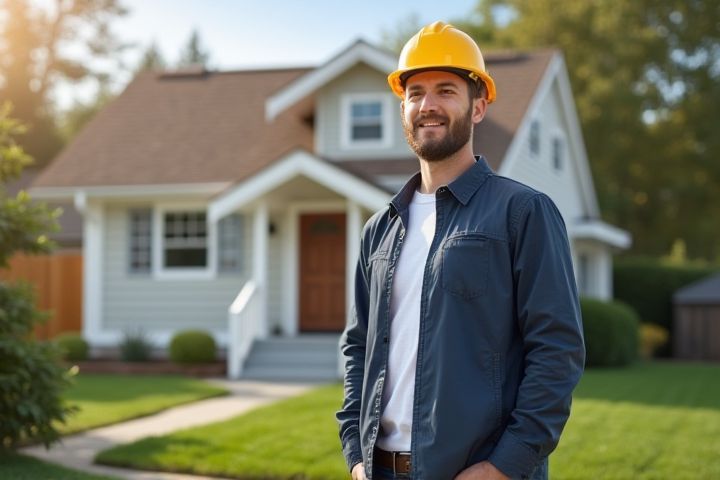
A professional home inspector conducts a thorough evaluation of a property before purchase, assessing its condition and identifying any potential issues. This inspection typically covers structural elements, roofing, plumbing, electrical systems, and HVAC. You should hire a certified home inspector who adheres to industry standards and has extensive experience in identifying defects. The report generated from this inspection is crucial for informing your purchasing decision or negotiating repairs with the seller. Timely inspections can save you significant expenses and help ensure your investment is sound.
Who Does House Inspection Before Purchase
Licensed home inspector
A licensed home inspector conducts thorough evaluations of residential properties prior to purchase, ensuring safety and compliance with local regulations. This professional examines structural components, electrical systems, plumbing, and HVAC units, often identifying potential issues that could cost you thousands in repairs. Typically, inspections can vary in length from 2 to 4 hours, depending on the property's size and condition. Most buyers receive a detailed report within 24 to 48 hours, enabling informed decision-making during the purchasing process.
Certified real estate agent
A certified real estate agent plays a crucial role in the house inspection process before a purchase, ensuring that you are well-informed about any potential issues with the property. They often provide referrals to licensed home inspectors who are experienced in evaluating the condition of the home, from structural integrity to electrical systems. By leveraging their knowledge of local market standards, agents can help you interpret inspection findings effectively, ensuring that your investment aligns with your expectations. This thorough assessment not only protects your financial interests but also enhances your confidence in the buying decision.
Licensed structural engineer
A licensed structural engineer evaluates a home's structural integrity before your purchase, ensuring it meets safety standards. They examine critical components such as foundations, load-bearing walls, and roofing systems, identifying potential issues that could lead to costly repairs--averaging between $2,000 to $20,000. Utilizing advanced tools and techniques, the engineer provides a thorough report detailing any concerns and recommended solutions. Engaging a licensed structural engineer can significantly influence your decision-making process, giving you peace of mind in your investment.
Professional pest inspector
A professional pest inspector conducts a thorough evaluation before your home purchase, identifying potential infestations of termites, rodents, or other harmful pests that could compromise the integrity of the property. They utilize specialized tools and techniques, including moisture meters and thermal imaging, to detect hidden infestations that may not be visible during a casual inspection. This expertise not only assesses the current pest situation but also evaluates potential risks for future infestations, helping you make a well-informed investment decision. Hiring a qualified pest inspector can save you from costly repairs and help ensure a safe, pest-free living environment for you and your family.
Plumbing specialist
A plumbing specialist conducts a thorough evaluation of the property's plumbing systems during a house inspection before purchase. This assessment includes checking the condition of pipes, fixtures, and water supply lines for leaks, corrosion, and proper function. They also examine the drainage system to ensure efficient wastewater removal and identify potential issues with sewer lines. Understanding these factors can significantly influence your home-buying decision, as plumbing repairs can be costly and affect your overall living experience.
Roof inspector
A roof inspector evaluates the condition of a property's roof, identifying potential issues such as leaks, damaged shingles, and signs of wear. This professional assesses various roofing materials, including asphalt shingles, metal, and tile, ensuring they meet safety and durability standards. During a house inspection, the roof inspector provides a detailed report that informs buyers about immediate repairs needed and the overall lifespan of the roofing system. Understanding these findings allows you to make an informed decision about your potential investment and associated maintenance costs.
Heating and cooling expert
Hiring a heating and cooling expert for a house inspection before purchase typically emphasizes the assessment of HVAC systems, which account for approximately 50% of a home's energy use. The expert thoroughly evaluates heating units, air conditioning systems, and ductwork to identify potential inefficiencies or necessary repairs that could lead to costly future expenses. By ensuring the HVAC system is in optimal condition, you can potentially save thousands in energy bills and maintenance costs over time. Many buyers choose to invest in this specialized inspection to protect their investment and enhance comfort in their new home.
Electrical system inspector
A house inspection before purchase emphasizes a thorough evaluation of the electrical system, which includes checking the condition of wiring, outlets, and the electrical panel. Inspectors often look for signs of wear, such as frayed wires or outdated components, and may verify proper grounding and bonding. Additionally, they assess the capacity of the electrical system, ensuring it meets safety standards and the needs of modern appliances. Prioritizing this inspection can help you avoid costly repairs and ensure the safety of your future home.
Environmental assessor
An environmental assessor plays a crucial role in house inspections before purchase, focusing on potential environmental hazards that could impact the property. This includes evaluating soil contamination, assessing air quality, and inspecting for the presence of hazardous materials like lead or asbestos. According to recent studies, nearly 15% of residential properties may have some form of environmental risk requiring in-depth analysis. By engaging with an environmental assessor, you can make an informed decision to safeguard your investment and ensure a safe living environment.
Insurance adjuster
A house inspection before purchase is crucial for understanding the condition of a property, and an insurance adjuster plays a key role in this process. Typically, inspections cover structural integrity, plumbing, and electrical systems, identifying potential risks that could impact your insurance premiums. On average, a home inspection can cost between $300 to $500, but it can save you thousands in future repairs or insurance claims. Engaging with an insurance adjuster ensures you're aware of any existing damages, helping you make an informed decision about your investment.
